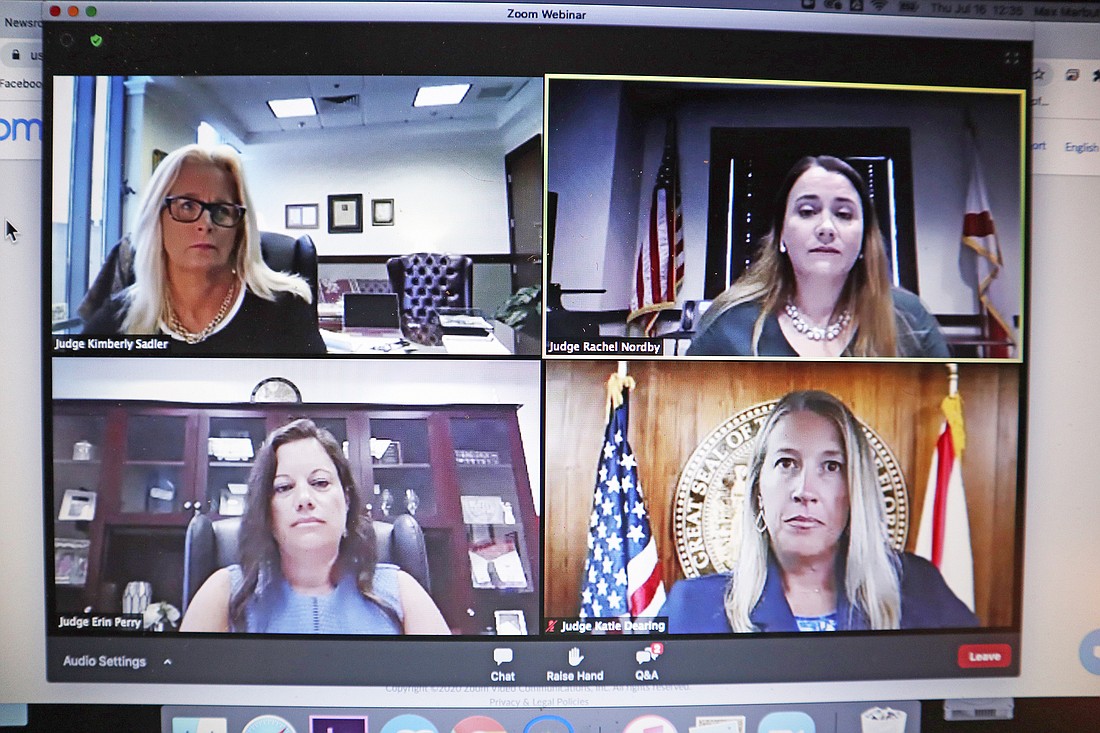
The Jacksonville Women Lawyers Association presented at the group’s July 16 virtual meeting a look at what it takes to become a judge.
The panel comprised 1st District Court of Appeal Judge Rachel Nordby, Circuit Judge Katie Dearing and Duval County Judges Erin Perry and Kimberly Sadler.
There are two ways to become a judge in Florida: Apply and be appointed by the governor or campaign for the office and win the election.
Nordby was appointed to the appellate court in October 2019; Dearing was elected unopposed and sworn in to the 4th Circuit in January 2019; Perry was appointed in January 2019; and Sadler was elected in August 2018.
Dearing succeeded her father-in-law, retired Judge Peter Dearing. She said she applied for a vacancy on the bench several years ago and was presented to the governor by the Judicial Nominating Commission, but wasn’t appointed.
“I didn’t appreciate how much connections matter. You need support and references,” Dearing said.
“I was young and nobody knew who I was. The JNC needs to know who you are and your reputation,” she said.
Perry agreed that being less experienced than other candidates for nomination is a disadvantage, but she didn’t perceive being at a disadvantage because she’s a woman who wanted to be a judge, even with the historic gender disparity on the bench.
“The JNC was hospitable. I didn’t feel there were challenges because I’m a woman,” she said.
Nordby said when she was preparing to be interviewed by the nominating commission she “self-perceived” a challenge because she took time off to care for her child.
“I had a two-year gap in my career. That’s not something to be defensive about and it wasn’t an issue for the JNC,” Nordby said.
She advised early preparation if an attorney wants to be appointed to he bench. The application is comprehensive, including practice history, personal and professional references, financial disclosure and writing samples.
Don’t be discouraged if you aren’t nominated the first time you apply, Nordby said. After the panel adjourns, contact members of the commission and ask for feedback.
“That can help you next time,” she said.
Perry, who was an assistant state attorney when she applied, said she presented a chart of her more than 11 years of trial experience. That covered the criminal law side of being a judge. She completed CLEs in civil trial law to balance her prosecutorial experience.
“You need to educate yourself,” Perry said.
Attorneys who want to run for office should realize there will be sacrifices – and make sure your family supports your aspiration, Sadler said.
“Running for office is daunting. You’re always campaigning. It takes a lot of your life,” she said.
Dearing advises aspiring judges to “know why you want this job” and to seek a mentor, an attorney or judge who can help a candidate understand what they need to do to among the nominated.
JWLA President Sarah Mannion said the association has a Judicial Oversight Committee. Its member attend judicial candidate interviews to observe the process and log questions posed to candidate by the commissioners.
“That can help members with their applications,” Mannion said.
The association’s next virtual meeting is scheduled Aug. 4, when the 2020-21 board of directors and President Cyndy Trimmer, a partner at Driver, McAfee, Hawthorne & Diebenow, will be sworn in to office.
Mannion said the Woman Lawyer of the Year award will be presented during the meeting. The program will be a discussion of mental health related to the impact of the COVID-19 pandemic.